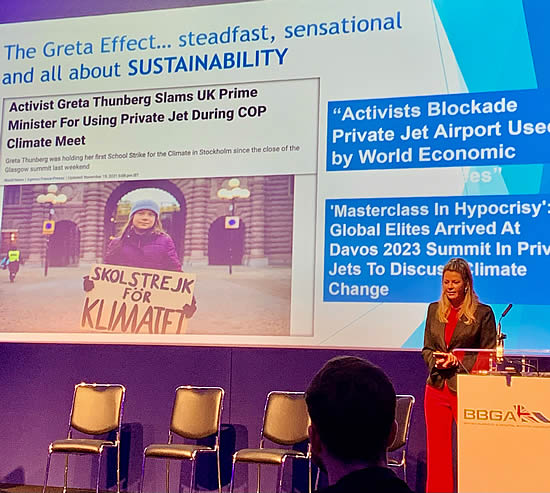United Kingdom Flying into a new era: Highlights from BBGA’s annual conference 2023 |
Future workforce, industry perception, how AI is advancing the industry, protecting small airfields and the wish to keep close to Europe (and EASA) packed a full agenda at BBGA’s annual conference on March 2nd.
This year’s move to a London venue - Royal Leonardo Hotel St Paul’s - drew a record 150 delegates, with more business aviation operators attending than ever before, including SETOps ambassadors RavenAir and Jetfly. Engineering apprentices from new BBGA member Marshall Skills Academy attended with partner Bombardier, joining peers from London Stansted College.
A popular choice, Textron Aviation’s super salesman Tom Perry, affectionally known as Mr Cessna in Europe, was announced as the 2023 winner of the Michael Wheatley outstanding achievement to industry award.
Keynote speaker Rana Walker, co-founder and principal consultant for business development and crisis management firm GR&AT, wanted everyone in the room to get on the front foot. “Shout out and be proud of all the great work that business aviation enables,” she said. It’s much more likely to be medical, cargo, humanitarian, and business-related missions (versus celebrity flying).

Keynote Speaker Rana Walker.
We live in a world of misinformation - exacerbated by clever, disruptive AI tools like Chat GPT, so it’s your job to tell your own story, urged Rana. Be visible, locally and regionally, engage, collaborate and use social media platforms Instagram, TikTok and Twitter to combat misinformation from business aviation opponents. Work with a futurist and add a science-based activist to your Board to enhance awareness, she suggested.
During a lunchtime media briefing, sponsored by Hunt & Palmer, Pula Aviation’s Centreline shared they were the first in the UK to offer SAF from their Bristol Airport FBO. Pilots just turn up and opt to take SAF. They rarely do, however, said COO Gus Paterson, underlining that even when it’s readily available, the cost needs to come down for widespread use.
James Hardie, founder of Course Correction Consulting (and formerly Collins) highlighted what Millennials and Gen Z want from a future career and how the misconception of business aviation may be stopping them from going down that path. “They may have had a parent or sibling in aviation who lost work during Covid, putting them off - it’s not just the sustainability issue.” They do want - work/life balance; flexible hours; remote working; health and well-being. Other important criteria are an inclusive environment, an employer with a global outlook, which maximises technology, innovation and pushes boundaries.
“They will find all that in business aviation.” he suggested. Personality traits - hopeful, resilient, efficacious, optimistic, help keep young people keep positive in the workforce when life is challenging, said James.
The workforce theme was addressed by Sophie Jones, Head of Organisational Capability at the UK Civil Aviation Authority. The UK CAA used to be the place that people would come to after they had worked in the aviation industry, or in the military, she said. “We are now helping to build industry careers. We have ramped up over the past six months and welcomed 50 apprentices across 10 apprenticeship standards. And it's not just 18 to 24 year olds. Our recruits range from new apprentices in their early careers to existing colleagues looking to learn new skills. We've had people in their 40's and 50's looking to retrain - and we want to do more.” The CAA is now looking to support new opportunities for apprenticeships for roles in flight operations, data/technology and ground handling.
Careers’ STEM Tree
Sophie presented a newly launched careers’ 'tree' which BBGA Managing Director Lindsey Oliver helped inspire, showing there are a wide range of aviation career opportunities.
Over the summer, the CAA supported a successful internship programme with Cranfield University, achieving a 70% retention rate. It’s progressing with a similar programme with Cranfield this year and its virtual work experience programme, launched in 2022 in partnership with Springpod, funded by the DfT, has attracted 2,000 students nationally. The virtual programme returns this year, together with the development of an in person programme. Its STEM microsite continues to be developed - a valuable resource hub for teachers, students and parents. https://stem.caa.co.uk/

Routes into Aviation.
Working closely with the Government-funded Talent Retention Scheme and Talent View has delivered excellent results, said Marc Bailey, BBGA’s CEO. TRS has now aligned with schools to provide 50,000 students with aviation content. Some 337 organisations support TRS now. (At the time of this event it was showing over 1,000 live jobs). Careers’ days have been held at Farnborough and London Biggin Hill Airports too.
BBGA’s closeness to DfT and the UK CAA is important for its nearly 200-strong membership and the association’s working groups (including Operations, FBO and sustainability). We work closely with other associations and are ramping up our GA for biz activity. “Keeping a voice within EASA is a priority. It’s important we retain our European links and ‘stay in the game,” said Marc.
Post Brexit David Kendrick, Head of Licensing, UK CAA, summarised the regulator’s work in numbers during 2022. Over 10,000 foreign carrier permits issued; support to 180 scheduled air carriers requiring third country operator certificates and over 700 TCO’s. The CAA granted over 8,000 pilot and 5,000 aircraft engineering licences; handled 400 applications from non-UK based airworthiness organisations; evaluated seven ANSPs who provide ATC services at the boundary of UK airspace; authorised 20 air training organisations and approved 350 simulators. This year the focus is for airline licensing, David said, including the wish to see seamless foreign carrier permits and a doubling down on illegal public transport (in the wake of the high-profile Sala case). “Allow us to help you, but sometimes you need to help yourselves,” he concluded.
United, strategic UK airfield policy sought
A panel addressing small UK airports, chaired by Marc Bailey, tackled levelling up and an urgent need for support. “You don’t need levelling up with a whole-country approach,” said Alex Durand, CEO of SaxonAir. John Gilder, co-chair of General Aviation Awareness Council and the Airports’ Working Group of the All Party General Aviation APPG (which Grant Shapps used to chair) has been advocating for a strategic airfield network review on how these airfields are used. We would like to examine if these sites are in the right place. (Most small airports are disproportionately concentrated in the east of the British Isles.) Do we need more, can we afford to lose some? We’ve been waiting some time for government approval to start this and agree the funding,” said John.
Deemed to be ‘brownfield sites', airfields are easy targets for housing and commercial redevelopment. Steve Ford, founder of consultancy Sky Harbour UK asserted. “If there was a suggestion to fill in Portsmouth Harbour to accommodate housing or commercial development, there would be an outcry. Yet we have a situation where existing infrastructure is systematically being dismantled,” he said.
“We are custodians of this industry and we can’t lose connectivity”
This will only get worse when next gen, zero-emissions aircraft enter service, requiring power grids and renewable electricity generation. SaxonAir CEO Alex Durand asked - do drones need airfields, or do you have an airfield as a Centre of Excellence where traditional skills and education and opportunities come together to feed in and out of. John Gilder highlighted we have 28 trauma hospitals in the UK - yet 18 do not have a heli pad. Government attention is needed to realise a long-term strategy, but in preparation, airfields should keep close to their tenants, airfield users and local communities, he said. Sky Harbour moved to Coventry Airport, only to learn weeks later, it was to close to be redeveloped as an automotive battery production facility. We spent a year engaging with anyone and everyone at Coventry, using guerrilla marketing to get the message across that an airport’s value to the community is vital. It’s an ongoing problem, but we’re part of the solution, he said. “We are custodians of this industry and we can’t lose connectivity,” stated Steve.
The Engineer shortage
The shortage of engineers was covered too. Aircraft are flying more. Wages are increasing and the market is competitive. Inevitably, it will be a struggle in the next five years and so far the sector has not been recognised on any Government (future talent) scheme. Paul Thompson, General Manager at Bombardier London Service Centre, which formally opened at Biggin Hill Airport last autumn, said he’d like to see more support for this hugely important sector. Bombardier has grown its engineering team from an initial 150 to 260 and is upping that to 280 by year end.
Issues related to work permits, licensing engineers continues to be a major hindrance and it’s not getting any better, said Inflite The Jet Centre’s General Manager MRO Sebastian Albouy, who highlighted that peers in Germany didn’t have the same problem.
The popularity of this year’s London venue means that BBGA will return to a central London venue in March 2023.
![]()
BlueSky Business Aviation News | 23rd March 2023 | Issue #694




